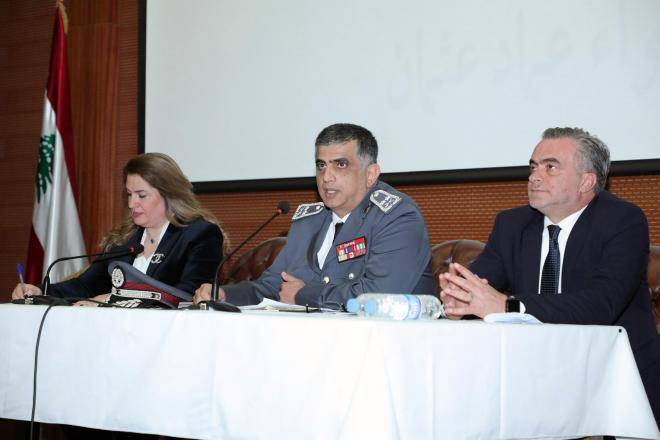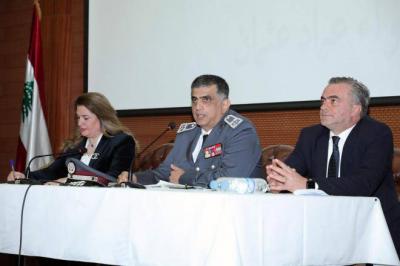The Director General of Internal Security Forces, Major General Imad Othman, delivered a lecture titled "Internal Security Forces between Achievements and Challenges" in the grand hall of the Bar Association in Tripoli, upon an invitation from the President of the Tripoli Bar Association, Attorney Marie Therese El Kawal, and members of the Bar Council. The event was attended by a large number of current and former lawmakers, former ministers from the north, the Chief Judge of Appeals in the north, several judges, the Beirut Bar Association President, the Presidents of the Doctors and Dentists Associations in the north, former Tripoli Bar Association Presidents, the Director of the Central Bank of Lebanon in Tripoli, the Head of Tripoli’s Finance Department, religious and spiritual figures, the Mayor of Tripoli, civil society organizations, leaders from the Internal Security Forces units, and several lawyers and senior officers.
The seminar began with the Lebanese national anthem and the anthems of the Bar Association and Internal Security Forces, followed by a welcoming speech from the event's moderator, Secretary of the Tripoli Bar Association, Attorney Munir Al-Hussaini.
Afterwards, Attorney El Kawal delivered a speech highlighting that the relationship between security and law is a complex partnership. The lawyer defends individuals' personal rights, while the security member ensures public order for the community. There can be harmony or conflict between private and public rights, but in either case, both parties must work together and leave room for justice, freedom, and stability. This equation is not difficult to achieve; it requires building trust and cooperation based on mutual respect and a collective effort to ensure security while protecting freedoms. Ultimately, achieving this equation fundamentally depends on the proper implementation of the law. While there may be some transgressions, a good relationship between the Bar Association and the Internal Security Forces, along with their members, is capable of resolving any misunderstandings or misbehavior. This is a legacy we have committed to preserve and nurture for the protection of the homeland and its values.
Major General Imad Othman's visit to the Tripoli Bar Association sends a clear message: we are together in carrying the burden of national security and peace, combating crime, and achieving justice, in all that serves the community's tranquility. Even though one comes from one side and another from another, a common meeting point must be reached, for in the end, "we are all for the homeland."
Major General Othman is well-regarded by the Bar Association. Since he joined the military service and rose to the highest ranks within his institution, he has never strayed from the path of integrity and balance, despite the harsh conditions the nation has faced during his service. He has found ways to keep security detached from the political tug-of-war that threatens to tear apart the nation and to focus on significant security and criminal files, most notably uncovering spy networks and bringing them to justice following professional preliminary investigations that cannot be disputed.
At the beginning of his lecture, Major General Othman expressed gratitude to Attorney Marie Therese El Kawal and the Bar Council in the north for their kind invitation, as well as appreciation for everyone in attendance. He emphasized the importance of Tripoli, Lebanon's second capital and capital of the north, which, while deprived of balanced development, has not lost its identity rich in culture, belonging, openness, and coexistence. Tripoli boasts historical, cultural, and civilizational significance, being a city of knowledge and scholars, and a meeting place for the gentle, morally upright, self-sacrificing, and nationalistic people of the north who deserve dignity, security, and safety.
During his lecture, Major General Othman outlined the following topics: the missions of the Internal Security Forces in the realm of administrative and judicial policing, the role of security forces in maintaining safety and order while protecting freedoms, and the emphasis on respecting human rights. He spoke about the challenges facing the security forces, including a sharp decrease in the budget—down to 95%—staff shortages, and reduced salaries due to economic conditions, as well as the management of prisons and the repercussions of severe overcrowding. He highlighted the significant security achievements that have been made despite numerous difficulties in combating various crimes (terrorism, espionage, drug trafficking, theft, murder, etc.), noting that most of these crimes had decreased in 2022, and reaffirmed the strategic vision of the Internal Security Forces summarized as "Together... towards a safer community."




